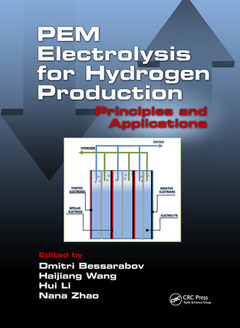PEM Electrolysis for Hydrogen Production Principles and Applications
Coordonnateurs : Bessarabov Dmitri, Wang Haijiang, Li Hui, Zhao Nana

An ever-increasing dependence on green energy has brought on a renewed interest in polymer electrolyte membrane (PEM) electrolysis as a viable solution for hydrogen production. While alkaline water electrolyzers have been used in the production of hydrogen for many years, there are certain advantages associated with PEM electrolysis and its relevance to renewable energy sources. PEM Electrolysis for Hydrogen Production: Principles and Applications discusses the advantages of PEM electrolyzers over alkaline electrolyzers, presents the recent advances of hydrogen PEM fuel cells accelerating the large-scale commercialization of PEM electrolysis, and considers the challenges that must be addressed before PEM electrolysis can become a commercially feasible option.
Written by international scientists in PEM electrolysis and fuel cell research areas, this book addresses the demand for energy storage technologies that store intermittent renewable energy and offers the most complete and up-to-date information on PEM electrolysis technology and research.
The authors:
- Cover the fundamental applications of PEM electrolysis
- Review the state-of-the-art technologies and challenges related to each of the components of the PEM electrolysis
- Address failure analysis and review available failure diagnostic tools
- Provide future direction for researchers and technology developers
PEM Electrolysis for Hydrogen Production: Principles and Applications provides a fundamental understanding of the requirements and functionalities of certain components and attributes of the PEM electrolysis technology that are common for both PEM fuel cells? and electrolyzers? hydrogen applications for energy storage. Beneficial to students and professionals, the text serves as a handbook for identifying PEM electrolysis failure modes and diagnosing electrolyzer performance to improve efficiency and durability.
Overview of PEM Electrolysis for Hydrogen Production. Fundamentals of PEM Water Electrolysis. Electrocatalysts for Oxygen Evolution Reaction. Electrocatalysts for the Hydrogen Evolution Reaction. NSTF for PEM Water Electrolysis. Membrane. Bipolar Plates and Plate Materials. Current Collectors (GDLs) and Materials. Proton Exchange Membrane Electrolyzer Stack and System Design. Characterization Tools for Polymer Electrolyte (PEM) Water Electrolyzers. Degradation Processes and Failure Mechanisms in PEM Water Electrolyzers. Modeling of PEM Water Electrolyzer. Fundamentals of Electrochemical Hydrogen Compression. Large-Scale Water Electrolysis for Power-to-Gas. Depolarized Proton Exchange Membrane Water Electrolysis: Coupled Anodic Reactions. Generation of Ozone and Hydrogen in a PEM Electrolyzer. Isotope Separation Using PEM Electrochemical Systems.
Dr. Dmitri Bessarabov joined the Department of Science and Technology Hydrogen South Africa (HySA) Infrastructure Center of Competence at North-West University and the Council for Scientific and Industrial Research in 2010. His research covers hydrogen and electro-catalytic membrane systems for energy applications and fuel cells. In 1991, Dr. Bessarabov received his M.Sc in chemistry at Lomonosov Moscow State University in Russia before continuing his studies at the Topchiev Institute of Petrochemical Synthesis of the Russian Academy of Sciences. In 1993, he joined the Ph.D program at the Institute for Polymer Science, University of Stellenbosch in South Africa, where he received his Ph.D in 1996.
Dr. Haijiang Wang Dr. Hui Li
Date de parution : 09-2015
21x28 cm
Disponible chez l'éditeur (délai d'approvisionnement : 15 jours).
Prix indicatif 214,69 €
Ajouter au panierDate de parution : 07-2017
21x28 cm
Disponible chez l'éditeur (délai d'approvisionnement : 14 jours).
Prix indicatif 105,47 €
Ajouter au panierThèmes de PEM Electrolysis for Hydrogen Production :
Mots-clés :
PEM Electrolyzer; PEM; PEM Water Electrolysis; Bipolar Plates; Electrocatalysts; Water Electrolysis; Oxygen Evolution Reaction; PEM Fuel Cell; Hydrogen Evolution Reaction; Catalyst Layers; NSTF; Electrolyzer Stack; Membrane; Current Density; Gas Diffusion Layer; Plate Materials; Fuel Cell; Current Collectors (GDLs); Polymer Electrolyte Membrane; Proton Exchange Membrane Electrolyzer Stack and System Design; Current Collectors; Polymer Electrolyte Membrane (PEM) Water Electrolyzers; Proton Conductivity; Degradation Processes; Cl; Failure Mechanisms; Exchange Current Density; Electrochemical Hydrogen Compression; PFSA Membrane; Large-Scale Water Electrolysis; Charge Transfer Resistance; Power-to-Gas; Cathode Catalyst Layers; Depolarized Proton Exchange Membrane Water Electrolysis; Cell Voltage; Coupled Anodic Reactions; Polarization Curve; Generation of Ozone; Tafel Slope; Isotope Separation; PEM Electrolysis; PEM Electrochemical Systems; Ce Ll; PbO2 Anodes; Anode Current Collector



